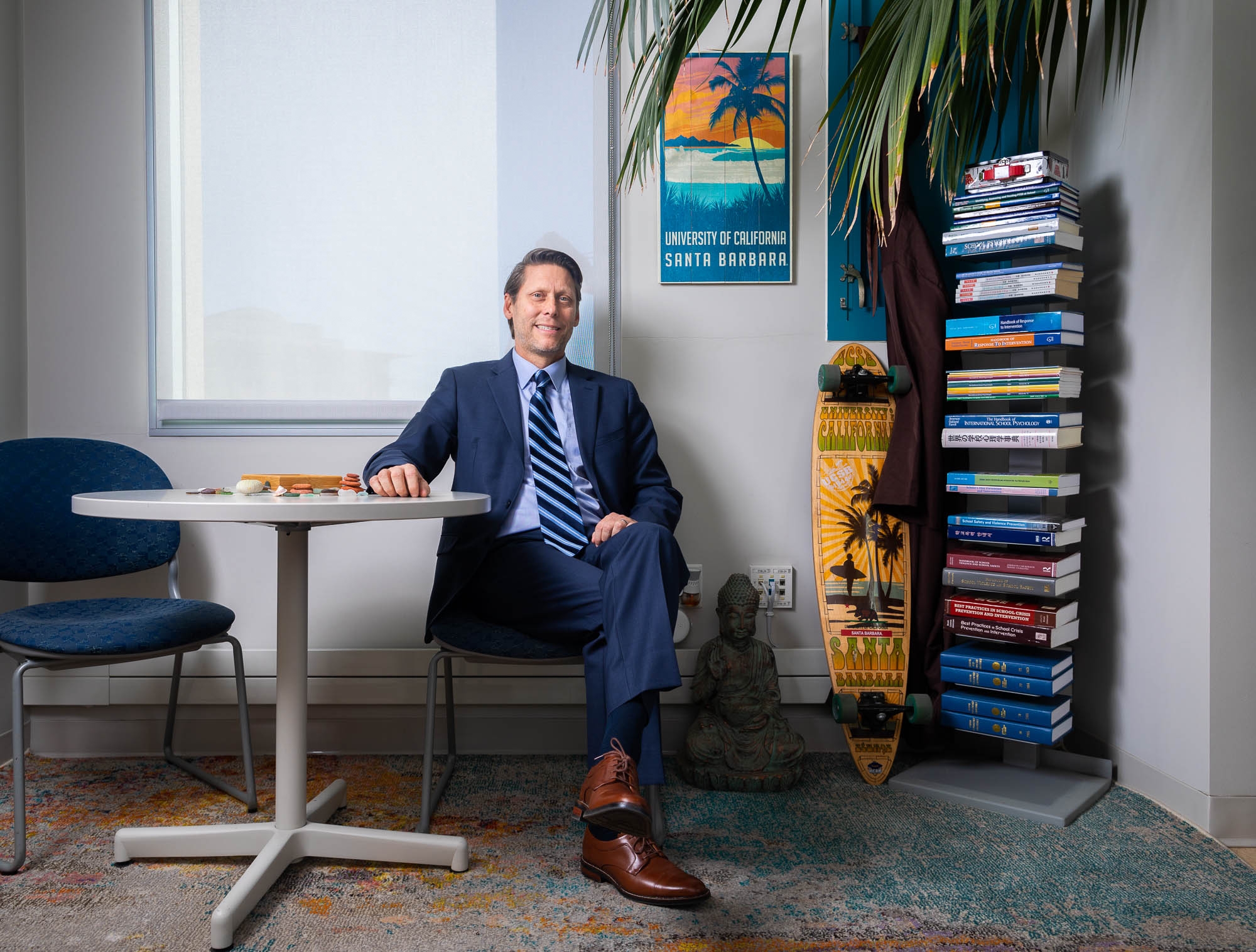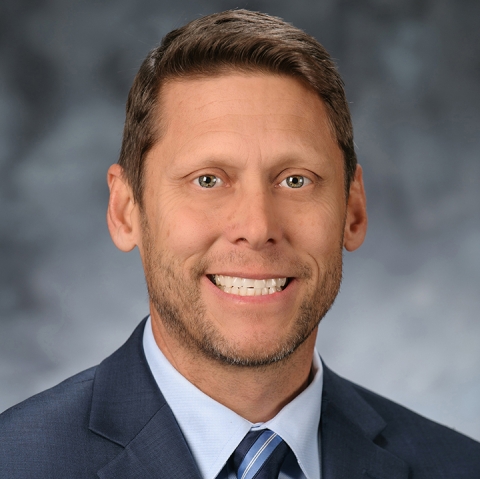
When it came to learning the value of hard work and dedication, school psychology professor Shane Jimerson got an early start. Growing up on a farm in rural Iowa, his chores often started before sunrise and ended after dark, with school and sports in between.
This “farmboy work ethic,” Jimerson said recently, has helped him tremendously ever since he set off down the gravel road from the family farmhouse after high school to land at UC Berkeley, where the seeds of his prolific career would take root. He has since become a leader — and a professor of the Gevirtz School at UC Santa Barbara — in the fields of school psychology and child development related to school violence prevention, youth bereavement and the trajectories of academic achievement.
Honoring his body of work and ongoing contributions as a scholar, mentor and graduate educator, the National Association of School Psychologists (NASP) has named Jimerson the recipient of its 2023 Lifetime Achievement Award.
“The award is an incredible honor,” Jimerson said. “Having the opportunity to help children, schools and families has been an incredible privilege throughout my career.”
The award will be presented during NASP’s annual convention, Feb. 7–10, held at the Colorado Convention Center in Denver. The association’s lifetime achievement award is its most distinguished prize, recognizing school psychologists who have made significant and lasting contributions during at least 25 years of service in the field. Founded in 1969 to advance effective practices to improve student learning, behavior and mental health, NASP represents more than 24,000 school psychologists, graduate students and related professionals throughout the U.S. and 25 countries worldwide.
Jimerson’s NASP award comes on the heels of two other prestigious accolades. Last year, he was given a 2022 Senior Scientist Award in school psychology from the American Psychological Association. In 2021, the California Association of School Psychologists honored him with its Lifetime Contributions Award.
Off to College
The first in his family to go to college, Jimerson worked full time to put himself through school at UC Berkeley, where faculty and graduate students helped shape his career path. As an undergraduate, he worked closely with mentors on various research projects, one of which studied children born to mothers addicted to cocaine.
“I became interested in learning more about why people do what they do, and throughout my coursework, it impressed upon me the importance of early childhood development,” Jimerson recalled. “I also got excited about using research to help children. Bringing science to practice to help children has been my passion ever since.”
That was also around the time he came across a quote by American writer Henry David Thoreau: "I am unable to make the days longer, so I strive to make them better.”
He took it to heart. “It inspired me at Berkeley,” said Jimerson, who graduated in 1992 with a major in psychology and a minor in education. “Then in grad school at the University of Minnesota, I really leaned into it.”
Jimerson also credits the encouragement and letters of recommendation from his early mentors as paving the way.
“They helped get me into the Institute of Child Development (at the University of Minnesota),” he said. “It’s world-renowned, with many developmental psychologists. I was also surrounded by school psychologists and experts in special education.”
He also shifted his work ethic into overdrive, furnishing his office with a sleeping bag. “I just focused on my studies,” he said, “I ate when I was hungry, drank when I was thirsty and slept when I was tired.”
“Shane was one of the best students we had, and it was clear he would be a leader in the field,” said retired professor James Ysseldyke, co-advisor during Jimerson’s graduate work at the University of Minnesota. “He was one of the most energetic individuals I’d seen, handling multiple tasks, and was very ambitious and innovative and clearly very smart.”
Jimerson earned a master’s degree in child development in 1994. In 1997, he completed doctoral degrees in school psychology and child development; that same year, he accepted a position at UC Santa Barbara.
Responding to Crisis
In addition to his teaching and research duties at UCSB, Jimerson soon became part of the National Emergency Assistance Team, a small group of experts who would deploy to K–12 campuses in the aftermath of a school crisis — such as a shooting or natural disaster — to consult with local leadership, mental health providers and emergency responders.
“We’d provide resources and psychoeducation materials to teachers and caregivers and coordinate support for the education professionals, students and families impacted by the event,” Jimerson explained. “We’d also support the return to school procedures and consult on school-based and community-based services to facilitate healthy coping and adjustment of teachers, staff, students and families.”
As they responded to a growing number of crises — including back-to-back high school shootings in March 2001 in San Diego County — Jimerson and other members of the team started creating workshops and curriculum to teach planning, preparedness and prevention, as well as response efforts.
“We focused on training more experts and creating more teams, including at the state, regional, district and school levels,” he said. “We engaged in scholarship, published numerous handbooks and prepared professionals with what we had learned along the way, advancing the knowledge.”
One of the lasting results of their efforts, now in its third edition, is the PREPaRE curriculum in school crisis prevention and response.
“He’s always been an ardent student of dissemination, working ‘to get the word out’ on how to improve children’s lives,” said Ysseldyke, who helped spearhead the NASP nomination.
Jimerson’s work in that realm has since expanded, with a focus on bringing the science to practice to promote engagement and wellbeing and to reduce aggression, stress and prejudice among middle and high school students, as well as bullying prevention, grief support and special education.
“My efforts have focused on facilitating social, emotional, behavioral, mental health, as well as academic development, with an emphasis on support for children at school,” Jimerson emphasized. “Given that most children, most days, are at school, this provides us with a tremendous opportunity to facilitate healthy development, adjustment, coping and wellbeing every day and regardless of family resources, insurance or other factors that can limit access to services among many children from underrepresented and/or marginalized groups.”
The Next Generation
Throughout his career, Jimerson has reaped the rewards of hard work and dedication. But he also knows he couldn’t have done it without proper guidance — mentors matter.
To pay it forward, he now mentors undergraduates doing fieldwork in local elementary schools. He also prepares graduate students to become the leaders who will, in turn, train new generations of school psychologists to take on the mounting challenges that young people are facing.
On top of bullying and deadly violence, today’s education experts also contend with kids navigating social media, plus spiking numbers of teen suicides and mental health disorders — issues difficult in and of themselves, without the added weight of a pandemic or the existential threat presented by climate change.
At the same time, the new generation of experts must continue to advance the knowledge and continue to serve culturally and linguistically diverse children and families, he said. “This has been an area of ongoing commitment. Many of the experts coming out of UCSB are from backgrounds that have been historically underrepresented.”
(805) 893-3207




